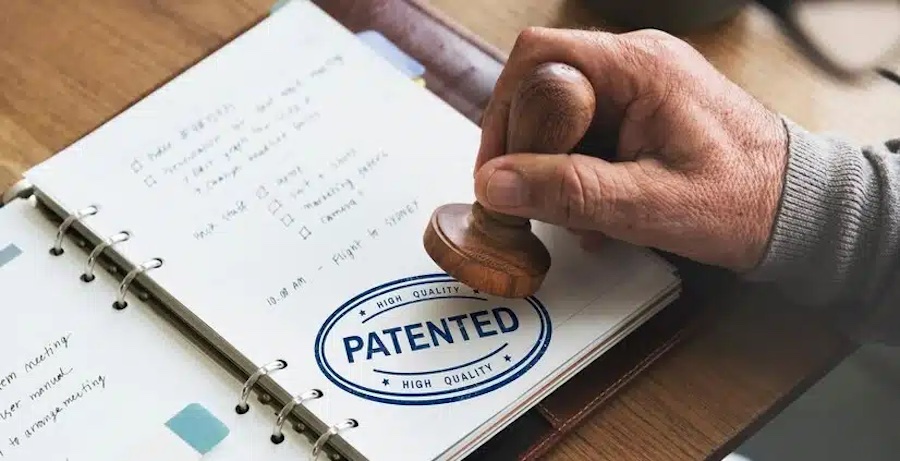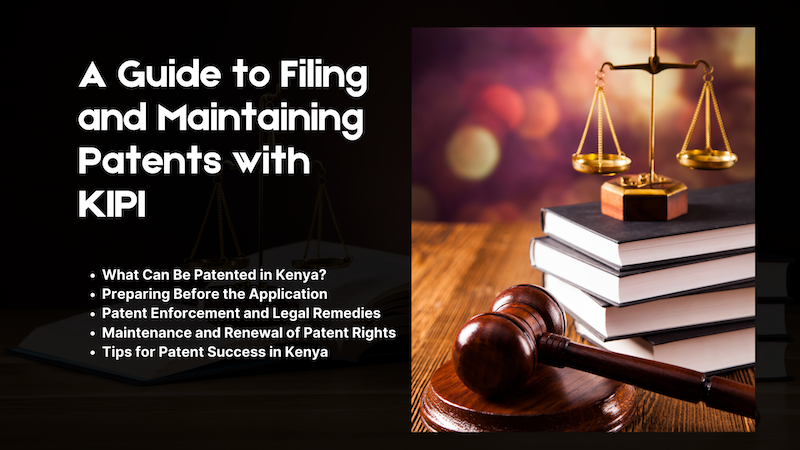Patents remain one of the most effective legal tools for safeguarding innovative ideas and technological advancements. In Kenya, patents are administered by the Kenya Industrial Property Institute (KIPI), which oversees the registration, examination, and management of patent rights.
Whether the innovation comes from an individual inventor, a startup, or a research institution, a clear understanding of the patent application process is essential in turning an idea into a protected and commercially viable asset.
I. What Can Be Patented in Kenya?
To be granted a patent in Kenya, an invention must meet three fundamental criteria:
- Novelty – The invention must not have been made public before the filing date.
- Inventive Step – It must not be an obvious improvement to someone with knowledge in the field.
- Industrial Applicability – The invention must be capable of being used in any industry.
It should be noted that software programs, natural discoveries, and mathematical methods are generally not considered patentable under Kenyan law.
II. Preparing Before the Application
Before submitting a patent application to KIPI, the following steps are recommended:
- A prior art search should be conducted to ensure that the invention is genuinely new.
- A comprehensive specification must be prepared. This includes a description, set of claims, an abstract, and any technical drawings.
- The claims section should be drafted with precision, as it determines the scope of legal protection granted by the patent.
III. Filing a Patent Application
Patent applications in Kenya may be submitted either physically at the KIPI offices or digitally via the eCitizen portal. The following documents are required for submission:
- Completed Application Form (Form IP3)
- The detailed specification including claims and description
- Proof of payment of statutory fees, which may include filing, search, and examination fees
IV. Examination and Publication Process
Once filed, the application goes through several stages:
- Formal Examination – The submission is reviewed for completeness and compliance with basic requirements.
- Substantive Examination – The novelty, inventive step, and industrial applicability of the invention are evaluated.
- Publication – If the application meets the requirements, it is published in the Kenya Industrial Property Journal. A 60-day window is then provided for any third parties to oppose the application.
V. Grant of Patent and Certification
If no opposition is received and all examinations are passed successfully, a Certificate of Grant is issued by KIPI.
The patent then enjoys 20 years of protection from the filing date, provided that annual renewal fees are paid consistently.
VI. Maintenance and Renewal of Patent Rights
Patent rights in Kenya must be renewed every year to remain valid. This involves:
- Submitting the relevant renewal forms
- Payment of prescribed annual maintenance fees
Failure to comply with these requirements may result in the lapse of patent rights, leaving the innovation unprotected.
VII. Patent Enforcement and Legal Remedies
Once granted, a patent provides the holder with enforceable rights. Enforcement options include:
- Civil Action – Legal proceedings can be pursued against infringers, seeking injunctions or compensation.
- Customs Enforcement – KIPI can assist in blocking the importation of products that infringe on patent rights.
- Licensing Agreements – Patents can be commercialized through licensing, allowing inventors to earn royalties while others legally use the protected technology.
VIII. Tips for Patent Success in Kenya

To increase the chances of a successful and enforceable patent, the following best practices are advised:
- Engage with accredited intellectual property (IP) agents for professional guidance.
- File early to establish priority and reduce the risk of prior disclosure.
- Explore international protection under the African Regional Intellectual Property Organization (ARIPO) or the Patent Cooperation Treaty (PCT) for inventions intended for global markets.
The patent registration process in Kenya, as administered by KIPI, provides a structured and reliable pathway for protecting inventions.
By carefully planning each step from application to enforcement, innovators are positioned to transform their creations into valuable intellectual property assets.
To successfully navigate this process and ensure compliance with all legal and technical requirements, expert support is highly recommended.
Let Clarity Pharma Consultancy walk you through the patenting process with confidence. Our experienced team offers tailored support in:
- Patent drafting and filing
- IP strategy and commercialization
- Regulatory guidance and innovation advisory
Protect your idea. Secure your future.
📞 Contact Clarity Pharma Consultancy today and take the first step toward turning your innovation into a protected marketable success.


